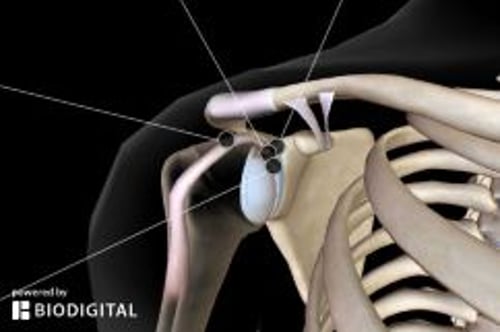The glenoid labrum usually tears as a result of a specific trauma, such as a fall onto an outstretched arm. Tears can also result from chronic overhead movement, as occurs in pitching. A glenoid labral tear causes pain during motion. Treatment is with physical therapy and sometimes surgery.
The shoulder (unlike the hip or elbow) is an inherently unstable joint; it has been likened to a golf ball sitting on a tee. To enhance structural stability, the glenoid (anatomically, a very shallow socket) is deepened by the labrum, which is a rubbery, fibrocartilaginous material attached around the lip of the glenoid. This structure can tear during athletics, especially during throwing sports, or as a result of blunt trauma when falling and landing on an outstretched upper extremity.
Symptoms and Signs of Glenoid Labral Tear
A glenoid labral tear results in deep shoulder pain during motion, especially when pitching a baseball. This discomfort may be accompanied by a painful clicking or clunking sensation and a feeling of catching in the shoulder.
Diagnosis of Glenoid Labral Tear
Usually contrast-enhanced MRI
A thorough shoulder and neck physical examination should be done initially, but referral to a specialist is frequently needed because more sophisticated diagnostic tests (eg, contrast-enhanced MRI) are often the only way to definitively identify the pathology. A superior labral tear from anterior to posterior (SLAP) and a Bankart tear (anterior) are the most common types of glenoid labral tears.
Treatment of Glenoid Labral Tear
Physical therapy
Sometimes surgery
Physical therapy is the initial treatment. If symptoms do not subside with physical therapy, and the diagnosis has been confirmed by MRI, surgical debridement or repair is the treatment of choice. Surgery is usually done arthroscopically.
Courtesy of Tomah Memorial Hospital, Department of Physical Therapy, Tomah, WI; Elizabeth C.K. Bender, MSPT, ATC, CSCS; and Whitney Gnewikow, DPT, ATC.
Courtesy of Tomah Memorial Hospital, Department of Physical Therapy, Tomah, WI; Elizabeth C.K. Bender, MSPT, ATC, CSCS; and Whitney Gnewikow, DPT, ATC.
Courtesy of Tomah Memorial Hospital, Department of Physical Therapy, Tomah, WI; Elizabeth C.K. Bender, MSPT, ATC, CSCS; and Whitney Gnewikow, DPT, ATC.
Courtesy of Tomah Memorial Hospital, Department of Physical Therapy, Tomah, WI; Elizabeth C.K. Bender, MSPT, ATC, CSCS; and Whitney Gnewikow, DPT, ATC.
Courtesy of Tomah Memorial Hospital, Department of Physical Therapy, Tomah, WI; Elizabeth C.K. Bender, MSPT, ATC, CSCS; and Whitney Gnewikow, DPT, ATC.
Courtesy of Tomah Memorial Hospital, Department of Physical Therapy, Tomah, WI; Elizabeth C.K. Bender, MSPT, ATC, CSCS; and Whitney Gnewikow, DPT, ATC.
Courtesy of Tomah Memorial Hospital, Department of Physical Therapy, Tomah, WI; Elizabeth C.K. Bender, MSPT, ATC, CSCS; and Whitney Gnewikow, DPT, ATC.
Courtesy of Tomah Memorial Hospital, Department of Physical Therapy, Tomah, WI; Elizabeth C.K. Bender, MSPT, ATC, CSCS; and Whitney Gnewikow, DPT, ATC.


















